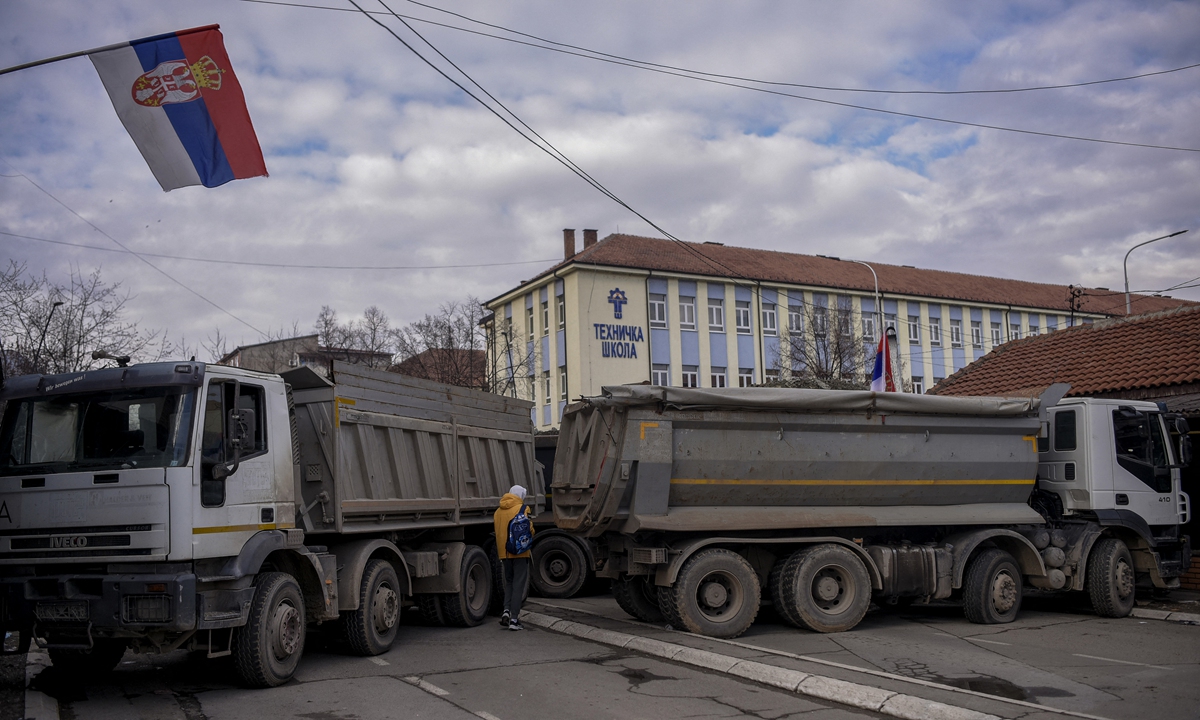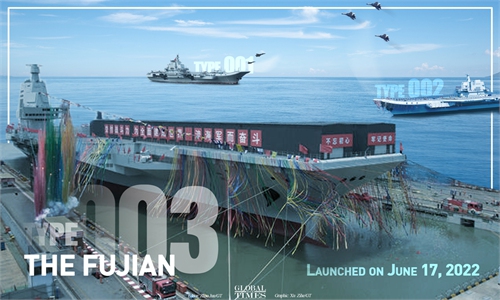
A pedestrian walks past a new road barricade set up in Mitrovica of Kosovo on December 28, 2022. Serbian armed forces are on highest level of alert, media reported. Photo: AFP
Editor's Note:
Will 2023 be relatively more peaceful than 2022 or will the world embrace another year of intensifying regional conflicts and uncertainties? Some media outlets and observers predicted that Russia-Ukraine conflict, energy crisis, struggling global economic recovery and continuous geopolitical wrestling between major powers are some of the challenges the world is facing when greeting the New Year. While the world has yet to walk out of the shadow of the pandemic, will it become more unified or divided? Who is behind the growing crisis and what role can China play?
People around the world will celebrate 2023 in a few days with hope and new plans. Peace is expected to be among many people's wish list for the new year, although there have been barely signs for a ceasefire or de-escalation between Ukraine and Russia as the war has profoundly changed the security landscape of Europe. In recent days, the escalating standoff between Serbia and Kosovo raised concerns that any mishandling of the situation could ignite a new powder keg, becoming another European flashpoint that is in danger of triggering new conflicts on the continent.
In Asia, especially in the Taiwan Straits where the security situation is extremely sensitive, 2022 was the year when hidden risks grew due to the provocations of the US. The reckless visit of US House Speaker Nancy Pelosi to the island in August indeed changed the status quo of the Taiwan Straits, prompting a series of countermeasures from China.
In both Europe and Asia, overall regional stability and order has been increasingly challenged by the US-led hegemony, as Washington has been disturbing regional peace by provoking conflicts, intensifying confrontation and inciting troubles, some Chinese experts said. Meanwhile, the relationships between major powers have been undergoing profound changes and it is difficult to get back to a normal relationship for countries like the US and Russia, which see their relations fall to an "ice age."
Some experts predicted that 2023 would see high uncertainties as the Ukraine-Russia conflict is highly likely to further escalate without a diplomatic solution. When more developed economies are forecast to enter recession in the next year, the prospects for peace and security grow dim, some experts said. Particularly the US may continue igniting new crises and provoking regional conflicts to achieve its strategic goals, export some of its domestic troubles and help reap profits for its monopolies, making the world more dangerous, according to experts.
In contrast to the US-led West that has been sowing discord in the world, China proposed the Global Security Initiative in 2022, calling for continued commitment to the vision of common, comprehensive, cooperative and sustainable security. The major initiative - proposed to meet the pressing need of the international community to maintain world peace and prevent conflicts and wars - also calls for respecting the sovereignty and territorial integrity of all countries and abiding by the purposes and principles of the UN Charter, taking seriously the legitimate security concerns of all countries and peacefully resolving differences and disputes between countries through dialogue and consultation.
Some experts see US hegemony as the root cause of the turmoil and conflicts, while the security initiative proposed by China are becoming more and more welcomed by other developing countries, featuring equity and justice and forging a strong synergy to build a community with a shared future for mankind.

A man fuels a vehicle at a gas station in Berlin, capital of Germany, on May 11, 2022. Germany's inflation rate in April rose to 7.4 percent amid soaring energy prices. Photo:Xinhua
Fragmented world
Russian President Vladimir Putin signed a decree on Tuesday on retaliatory measures to the West's imposition of a price cap on Russian oil. The document bans supplies of Russian oil to buyers who join the West's restrictions after February 2023, TASS reported.
The Kremlin's action comes as the global energy sector experienced an unprecedented supply crisis amid the Russia-Ukraine crisis, which also reshaped global energy supply.
"Russia and the Western countries have been fighting fiercely on the oil price cap, and the agreement reached by the West reflects that the world is now becoming fragmented with a growing rift between Russia and the West," Cui Heng, an assistant research fellow from the Center for Russian Studies of East China Normal University, told the Global Times on Wednesday.
The escalating tensions in 2022 showed that security as a public good has become extremely scarce, and the reason for such situation is that the dominant country providing security as a public good is in decline, Cui noted. "For instance, amid the global order centered on the US, Washington arbitrarily tried to change the order by abusing its rights, including squeezing Russia's influence in Europe and the infringement of Serbia's sovereignty, which is dissolving such order," he said.
In recent days, a significant escalation of tensions in the Balkans also worries the world. Serbian armed forces were on "the highest level" of alert, media reported on Wednesday, which highlighted the Balkan country's increasingly strained relations with Kosovo over recent shootings and blockades.
As for the situation in the Balkans, Cui Hongjian, director of the Department of European Studies at the China Institute of International Studies, believes that the course of the Ukraine crisis will have a linked effect on it.
Serbia has always upheld a relatively balanced diplomacy with the great powers, and its relationship with Russia is one of the bases to keep its confidence in this region. However, after the Ukraine crisis, the West, particularly NATO members, has become more negative toward Russia, and it is foreseeable that Serbia will face more pressure in the region, Cui Hongjian said.
Uncertainties for 2023
Some Chinese experts believe that 2023 would be a year of high uncertainties in global and regional security, especially if the Ukraine-Russia crisis further escalates, affecting overall security in Europe. And in Asia, the US-led confrontation against China will also intensify with Washington continuing to make waves in the Taiwan Straits and South China Sea.
"We should be wary of significant turbulences in relations between major powers in 2023," Li Haidong, a professor at the Institute of International Relations at the China Foreign Affairs University, told the Global Times on Wednesday.
Now there is a bloc confrontation between the US-led West and Russia, and the US is also trying to create similar confrontation in Asia by colluding with countries like Japan to contain China, Li said.
Could the Ukraine-Russia conflict get out of control and turn into a direct conflict between the US and Russia in the future? Will the US continue using small cliques such as AUKUS and Quad to contain China and boost support for "Taiwan independence" separatists in challenging China's bottom-line? Will more US allies follow its Indo-Pacific strategy in posing a challenge to the security of Asia? Those questions dampen the outlook for global peace and security in 2023, some experts said.
As it stands, both Russia and Ukraine pose the need for peace talks, but realistic conditions are not yet in place, Cui Hongjian noted. "Winter has come, and the two sides are unlikely to expect a new large-scale conflict during the season. The first half of 2023 is a critical period, and several indicators will determine the course of the overall crisis."
"It's unlikely that the Ukraine-Russia conflict will end, as the US won't easily let the war end," Wang Yiwei, director of the Institute of International Affairs at the Renmin University of China, told the Global Times on Wednesday.
The US is using the war to shape the new globalization by attracting industries and capital back to the US and weakening the Europe and Russia, feeding its military-industrial complex and energy sectors, Wang said. "It needs to achieve those goals by continuing to fuel the conflict."
Chinese State Councilor and Foreign Minister Wang Yi on Sunday said China will commit itself to the noble cause of peace and development for humanity on the new journey to build China into a modern socialist country in all respects.
China will stay committed to peaceful development, never seek hegemony or expansion, oppose hegemonism and power politics in all forms and manifestations, defend the legitimate rights of its people and people of all countries to pursue peace and development, and make China's contribution to addressing deficits in development and security, Wang said.
Unlike the US as manipulator behind the world's conflicts and confrontation, China will continue pushing forward the role of UN-led system in solving the global crisis and managing well the relations with neighboring countries by increasing the economic ties, Li noted.
"Also, we will continue enhancing relations with some US allies such as Germany, France, the Philippines, Australia and New Zealand so that when the US continues containing China by forming small cliques with its allies, it cannot easily achieve its strategic goals," he said.


